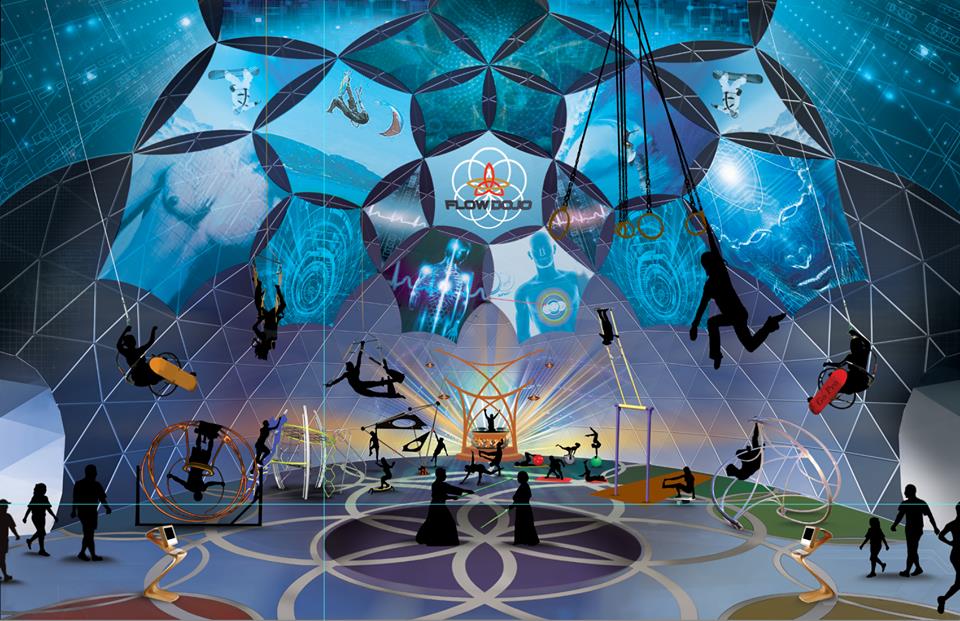Should the machines come for our jobs, not everyone will be able to shift into a rewarding career as a Zumba instructor. Someone will actually have to be in the Zumba class. That Zumba ain’t gonna do itself.
Luckily the Flow Industry is here to provide good jobs. As Casey Schwartz writes in a smart NYT Style piece “How to Hack Your Brain (for $5,000),” some are making a killing selling a “brain-shifting” system that allegedly allows people to “upgrade their nervous systems” and live in the moment. A former Esalen instructor named Jamie Wheal is a leader among the Flow educators, peddling the process with anti-Information Age fervor that ultimately sounds suspiciously like a slick Silicon Valley sales pitch, what with its promises of “hacking” and “optimization.” He hopes to increasingly marry the meditative method to neuroscience and heighten the results.
At present, his shoeless acolytes attend multi-day summits in Utah, listen to lectures in a white dome (“Flow Dojo”), do light exercise, engage in hyperventilation, live temporarily in tents and use centrally located porta-potties, which makes it possible for them to avoid shitting on the ground. It may seem like I’m making fun of those seeking to raise their consciousness—and I am!—but I also have a soft spot for people trying to comprehend the world at an off-center angle, if not for the ones charging thousands a head to “change minds.”
An excerpt:
But what is flow?
First popularized decades ago by the Hungarian psychologist Mihaly Csikszentmihalyi, flow is an elusive state cultivated by artists, athletes and others, that of being so absorbed in what they’re doing that they lose track of time and thought, finding themselves guided rather by instinct and intuition. It has also been referred to as the Zone — not to be confused with the diet of the same name — or just “being in the moment.” And for those who have experienced it, there is no denying its magic.
Dr. Csikszentmihalyi, who turns 83 this month, is a deeply philosophical academic formerly of the University of Chicago (now at Claremont Graduate University) and still publishing. In 2004 he gave a Ted Talk that has been viewed over four million times.Mr. Wheal has taken a somewhat brisker, more commercial approach. He has advised members of the United States Navy Special Operations, top-ranked athletes and executives of technology companies on “optimizing performance” through flow, receiving six-figure fees for some of his consultations.
His five-day retreat, at a sprawling, privately held property known as Summit and convened the day before the solar eclipse, cost almost $5,000 and was a sort of beta test for spreading his gospel to a larger public audience. (He also offers free assessments and videos on his website.)
Attendees were housed in white tepee-like tents, with portable toilets set up down a dirt path. The camp had been erected quickly by the “glamping” company Aether Camp, to Mr. Wheal’s specifications.
Mr. Wheal, who said his father was a test pilot for the British royal navy, came to the United States from England at age 8 and speaks rapidly in a mash-up accent, dropping idiosyncratic phrases and erudite references to the Soviet psychologist Lev Vygotsky, to Cincinnatus and Aldous Huxley. At moments he is given to phrases that are not immediately comprehensible, like “We are broaching the possibility of midwifing humanity into the infinite game.”
But his larger message came through clearly. In our digital age, loud with bottom-feeder commentary, the ping of incoming emails and bleating social media, the pursuit of flow is all the more urgent.
“Honestly, have we abdicated our purpose just because of these insistent micro asks?” Mr. Wheal said. “Have we just completely ceded our center, completely ceded clarity, and it was all just based on 20-something bro-grammers trying to crack our attention spans?”
To fulfill his flow-finding mission, Mr. Wheal wants to bring what he calls his Dojo Domes to locations around the world.•
Tags: Casey Schwartz

